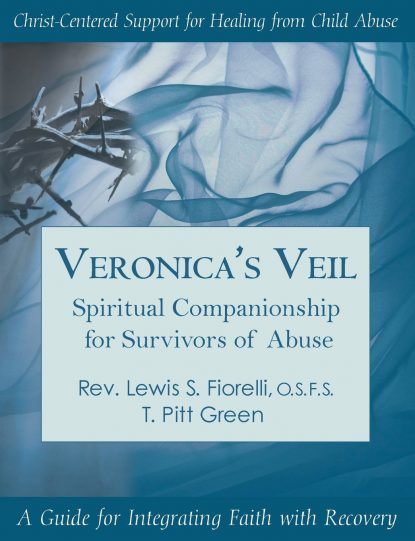 “Veronica’s Veil: Spiritual Companionship for Survivors of Abuse” by Father Lewis S. Fiorelli, OSFS, and T. Pitt Green. Dog Ear Publishing (Indianapolis, 2014). 405 pp., $29.95.
“Veronica’s Veil: Spiritual Companionship for Survivors of Abuse” by Father Lewis S. Fiorelli, OSFS, and T. Pitt Green. Dog Ear Publishing (Indianapolis, 2014). 405 pp., $29.95.
Given the sexual crimes by Catholic clergy that have come to light from 2002 onward, as well as increased societal awareness of the problem of child abuse in general, the paucity of officially approved Catholic literature for abuse survivors is shameful.
Among the tiny handful of print resources that do exist for Catholics who were sexually victimized as children, “Veronica’s Veil,” published in 2014 with an imprimatur from Bishop Paul S. Loverde, then head of the Diocese of Arlington, Virginia, is by far the most ambitious. Authors Father Lewis Fiorelli, an Oblate of St. Francis de Sales and a spiritual director, and Teresa Pitt Green, a survivor, seek to reach not only adult victims of abuse but also their priests, educators, spiritual directors and therapists.
[tower]
To that end, “Veronica’s Veil” offers a loosely systematized program for healing and renewal. It is divided into sections on “First Steps,” “Listening & Dialogue,” “Turning Points” and “Reconciliation.” These are further subdivided into brief reflections on topics of relevance to survivors and their caregivers, with alternating point/counterpoint commentary by the authors.
Additionally, each section is prefaced by separate reflections from each of the authors as well as a therapist, Frank J. Moncher. In this way, the book aims to offer a spectrum of spiritual wisdom and personal witness, presented in a manner that is sensitive to readers’ psychological needs.
The book’s spirituality is grounded in the earthy orthodoxy of Father Fiorelli’s Salesian outlook — patient, compassionate and solidly Christ-centered. To this, Green adds her perspective on how such spirituality may be translated into lived experience.
As might be expected with a book that sets its sights upon such a diverse audience, the writing of “Veronica’s Veil” has a diffuse quality. Powerful insights that could have a healing effect upon survivors are laid like buried treasures amid lengthy, outsider-friendly descriptions of victims’ perspectives.
The authors’ best insight is their recognition that survivors who seek healing through the Catholic Church must necessarily want to draw closer to God through the church’s sacramental life. Particularly helpful in this regard is their advice for priests and spiritual directors on how to help survivors approach the sacrament of confession.
Although “Veronica’s Veil” covers divine forgiveness well, its treatment of forgiving others is surprisingly brief and unsatisfying. It is a tense topic for survivors, to be sure; one can understand the authors’ reluctance to place any kind of spiritual pressure upon them.
Yet a simple quotation from the catechism’s teachings on forgiveness would have helped readers understand that its healing power was within their reach. “It is not in our power not to feel or to forget an offense; but the heart that offers itself to the Holy Spirit turns injury into compassion and purifies the memory in transforming the hurt into intercession” (Catechism of the Catholic Church, 2843).
***
Goldstein, who holds a doctorate in theology, is the author of several books, including “My Peace I Give You: Healing Sexual Wounds with the Help of the Saints” and “Remembering God’s Mercy: Redeem the Past and Free Yourself from Painful Memories.”
PREVIOUS: ‘Artemis Fowl’ fails to take flight
NEXT: Spike Lee’s ‘Da 5 Bloods’ is harsh, but heartfelt


Share this story